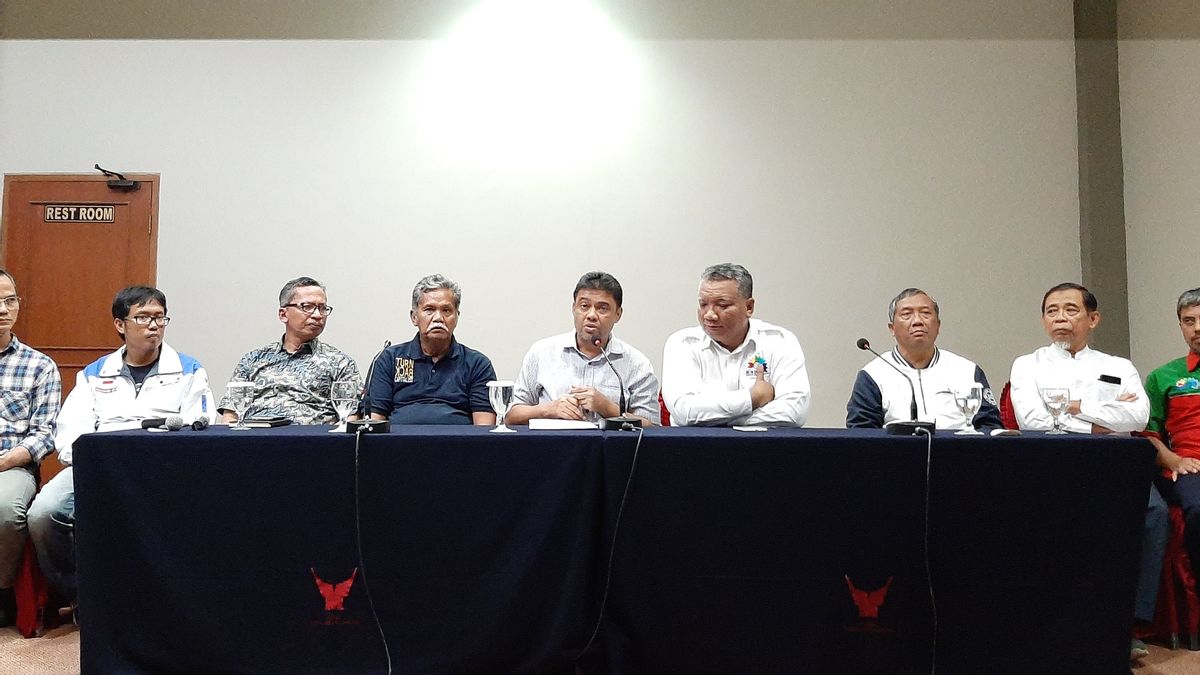JAKARTA - The Confederation of Indonesian Workers Unions (KSPI) has emphasized that it rejects the draft Work Creation Bill (RUU). Apart from that, KSPI also refused to join the team formed by the Coordinating Minister for the Economy Airlangga Hartarto. There are nine reasons why KSPI rejected this bill.
The President of KSPI Said Iqbal explained that the KSPI's stance has clearly never been and will not be included in the team formed by the Coordinating Minister for Economic Affairs related to the discussion of the omibus law on the Job Creation Bill.
If the name KSPI is in the composition of the team formed by Airlangga, it is without KSPI's permission. Because, his party never knew and was never invited, nor was he involved.
Iqbal said, there were nine reasons that made his party reject the Job Creation Bill. The nine reasons departed from three main points that were considered by KSPI not to be in the draft bill.
Three main things that are not in the Job Creation Bill, said Iqbal, first are job security or job security. Second, income security or income protection. Third, social security or social security.
Apart from that, said Iqbal, the government only formulated an increase in the minimum wage based on regional economic growth. In PP number 78 of 2015 concerning Wages, based on inflation and economic growth.
"So goods increase in inflation is not counted, if economic growth is an added value. But there is no inflation because it is calculated from GDP," he said.
Then, in the Work Creation Bill, continued Iqbal, the term labor-intensive wages appears. This means that this bill makes the minimum wage again below the minimum wage, namely the labor-intensive minimum wage.
"Users of outsourcing and contract employees throughout Indonesia, 60-80 percent use it because contracts and outsourcing are not limited, meaning that it will be rampant. So there is no minimum wage, use the wage per time," he said.
2. Loss of severance pay.
Iqbal explained that severance pay was lost because the Job Creation Bill allowed the free outsourcing of contract employees. Thus, contract employees and outsourcing do not need severance pay.
"Menaker appeared to say a five-month sweetener. We don't need it, but we need work certainty and social security. In Law number 13 of 2003 there are three severance pay. But in the Job Creation Bill, compensation for lost rights. The work period award is reduced," he explained
According to Iqbal, because the term wage payer in the Job Creation Bill is the hourly wage. Thus, severance pay cannot be received because severance pay is given one unit of result.
"Prolonged illness in Law number 13 is paid, if now he is fired and not paid. The retirement age cannot be severance pay. In Law number 13, severance pay is given twice the amount," he said.
3. Use of outsourcing.
The Job Creation Bill also allows for the free use of outsourcing. Even all kinds of work and unlimited time. In fact, previously stipulated that only five types of work were allowed, namely security, office boy (OB), mining contractor, catering worker, and transportation.
"In the past, only five types of work were allowed. In the Job Creation Bill, agents were accommodated and legally protected by being allowed to 'sell humans'," he said.
4. Exploitative working hours.
"Now, under Law 13 of 2003, one working day is seven to eight hours. Beyond that limit, overtime is calculated. Working time is one week, 40 hours of work. Meanwhile, in the Job Creation Bill, 14 hours per working day is also allowed , "he said.
5. Unlimited use of contract employees.
The Job Creation Bill also applies to contract employees for all types of work. In fact, this bill can also pose a threat to young workers because of the opportunity to be contracted for life.
"The Job Creation Bill now allows employees to be contracted for life. Our children, our grandchildren become contract employees for life, imagine," he said.
6. Use of TKA unskilled workers.
Not only that, the Job Creation Bill also has the potential to use foreign chasing workers (TKA) unskilled workers or unskilled laborers freely. Because, it does not require permission from the relevant ministries.
"Because there is no need for written permission from the minister. There are only a lot of written permits from the minister (TKA), if it is removed it's easier. Because of the corona virus, we know that there are many foreign unskilled laborers who work in Meikarta. All of them appear, because they have to report their health. lie, "he said.
In addition, the startup industry and educational institutions are also free to use foreign workers. "The company is in Indonesia, the employees in China are not caught. Because they are free," he said.
7. Facilitated layoffs.
Iqbal said, the Job Creation Bill made it easier for layoffs. Because many outsourcing and contract employees are free because there is no time limit, layoffs are considered to be easy.
"In a lifetime, it can be contracted and outsourced. In the Job Creation Bill, official outsourcing agencies are given space by the state," he said.
8. Loss of social security for laborers.
Iqbal said that the draft Work Creation Bill which was officially submitted to the DPR eliminated social security for labor workers. In particular, health and retirement.
"With contract employees and outsourcing, there is no social security for pensions. Workers who menstruate, are sick, have their wages deducted," he said.
9. Eliminated criminal sanctions.
In fact, there are no restrictions or sanctions if employers pay below the minimum wage. Because article 90 of Law 13 of 2003 concerning Manpower was abolished. "You can also not pay according to the minimum wage," he said.
The English, Chinese, Japanese, Arabic, and French versions are automatically generated by the AI. So there may still be inaccuracies in translating, please always see Indonesian as our main language. (system supported by DigitalSiber.id)









